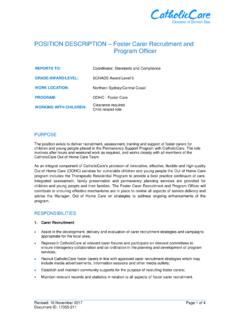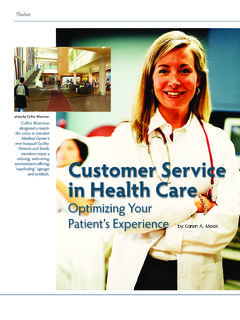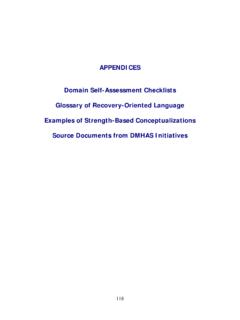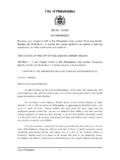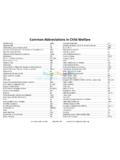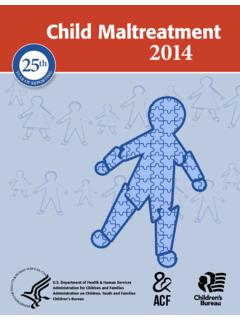Transcription of Failed By The System - Barnardo's
1 Failed By The System The views of young care leavers on their educational experiences Barnardo s There were too many promises made but not many fulfilled , care Leaver aged 16 Policy and Research Unit Policy & Research UnitPage 1 of 12 Policy & Research Unit CONTENTS 1. Introduction and findings of the Barnardo s survey and NOP Poll 2. Comparative table of detailed findings 3. What do we know about the problem? 4. What would have helped? 5. Barnardo s recommendations for change 6. Current information and statistics about children in care in the UK 7. References and contact details PAGE 2 of 12 Policy & Research UnitPage 2 of 12 Policy & Research Unit 1.
2 Introduction Barnardo s runs twenty two projects across the UK that offer support to young people who have been in the care System . These projects provide all round support for young people, helping them find and maintain accommodation; secure further education or training and employment and access important information about health and nutrition for example. They also provide invaluable emotional support to young people who may often be isolated from the rest of society. We believe that looked after young people (those who are in local authority care ) should be fully supported to maximise their educational potential. During the transition to adulthood they should be supported to enable them to make the most of all opportunities.
3 Good education which meets the needs of each child is crucial if this transition is to be successful and it can only be a matter of great shame that society s ability to be a good Corporate Parent appears to be severely compromised in this area. The educational under-achievement of children in care up until Year 11 is well researched and documented. However, despite the long standing recognition of this issue, there appears to have been no substantial improvement in recent years. As a leading children s charity, Barnardo s wanted to find out more about the factors that inhibit children doing better and what young people themselves felt and thought about their experiences of education We surveyed 66 young people aged between 16 and 21 who had been in care and who are supported by Barnardo s Leaving care projects.
4 They told us about their school life and education, giving information about the factors that inhibited them from doing well, those that had a positive effect and what could have helped them do better. PAGE 3 of 12 Policy & Research UnitPage 3 of 12 Policy & Research Unit 2. Findings from Barnardo s survey of young care leavers and a National Opinion Poll of 500 parents and carers of children not in the care System While we can say with certainty that looked after children do significantly worse when compared to other children in terms of educational achievements, it is quite difficult to quantify the impact of proper support, encouragement, attitudes, assumptions and aspirations on the education of looked after children.
5 Our survey asked for information regarding a range of factors that may have affected their education. It included questions about placements, schools, exclusions, support received, and qualifications gained. We also wanted to compare the experiences of children not in local authority care , so Barnardo s commissioned a National Opinion Poll seeking the views of 500 parents or carers of non-looked after children who took their GCSEs this year. We asked them similar questions to those we asked the care leavers and this gave us a comparative snapshot of the differences in aspirations for their children as compared to those who are looked after. Barnardo s believes that this comparison, while relatively small scale, is unique and provides an indication that, in general, parents and carers of children not in the care System have much higher aspirations and expectations that their child will do well in school, and provide the support and encouragement to help them achieve this.
6 Barnardo s service users: What the young people with experience of care told us. Qualifications 52 of the young people who had been in care had no GCSEs or other educational qualifications when they left school. Only 14 out of the 66 young care leavers had any sort of educational qualification when they left school. Only 7 had 5 or more GCSEs at grade A* - C Training etc over half (35) were not currently in employment, training or further education. Placement moves the number of care placements young people had lived in varied between 1 and 30 with four of them having had more than 24 placements. Thirty three young people had been in more than 4 placements and 27 of these had been in both residential and foster care .
7 The NOP findings: What parents and carers of children not in care told us Qualifications Only 6% of the parents and carers questioned are expecting their child to get no GCSEs whatsoever this August. Thirty percent of the parents questioned expected their child to get 9 or 10 GCSEs, 74% expected them to get at least five at grades A* - C. Only 1% expected their child to get only one GCSE Training etc over 90% of the parents said that their child expected to go into training or further education when they left school. Home moves fifty eight percent of the families surveyed had never moved home in the lifetime of their child, only 8% of the sample had moved home twice or more. PAGE 4 of 12 Policy & Research UnitPage 4 of 12 Policy & Research Unit School moves young people in the group had attended on average five schools.
8 Almost half the group had attended 6 or more schools and seven of the group had attended more than 10 different schools School exclusions forty one young people had been excluded from schools for periods lasting between 1 day and 2 years. Twenty two young people had been excluded for more than 60 days and 2 had no secondary education at all. Eighteen young people had received no alternative education in the time they were excluded. Attendance at parent s evenings etc twenty six young people said no one had attended their school parent s evenings and 32 said no one went to sports days or other school events. Where someone did attend it was more likely to be a foster carer than a residential or social worker.
9 Being bullied over half the group reported that they had been bullied at school and believed this was directly related to them being in care . Praise and rewards thirty one young people were never praised or rewarded if they did well at school and where praise was given it was mainly by a foster carer; only 4 said they had been praised by a teacher. Almost all said that praise would have encouraged them to try harder. Being involved in decision making twenty four young people told us that they were never involved in making decisions about their education for example which school they went to etc. School moves eighty five percent of the parents said their child had only attended two or three schools during their education life and 97% said their child had attended fewer than 5 schools.
10 School exclusions the majority of parents (93%) said their child had never been excluded from school; of those whose child had been excluded 83% said the exclusion had been for less than two weeks. Attendance at parent s evenings etc the majority of parents and carers (96%) attended their child s parent s evenings and only 28% didn t also attend sports day and other school events. Being bullied only 28% of the sample said that their child had been bullied at school. Praise and rewards almost the whole sample (97%) said that they praised or rewarded their child when they did well at school. Being involved in decision making Only 3% of parents said they never consulted their children about decisions regarding their education.











